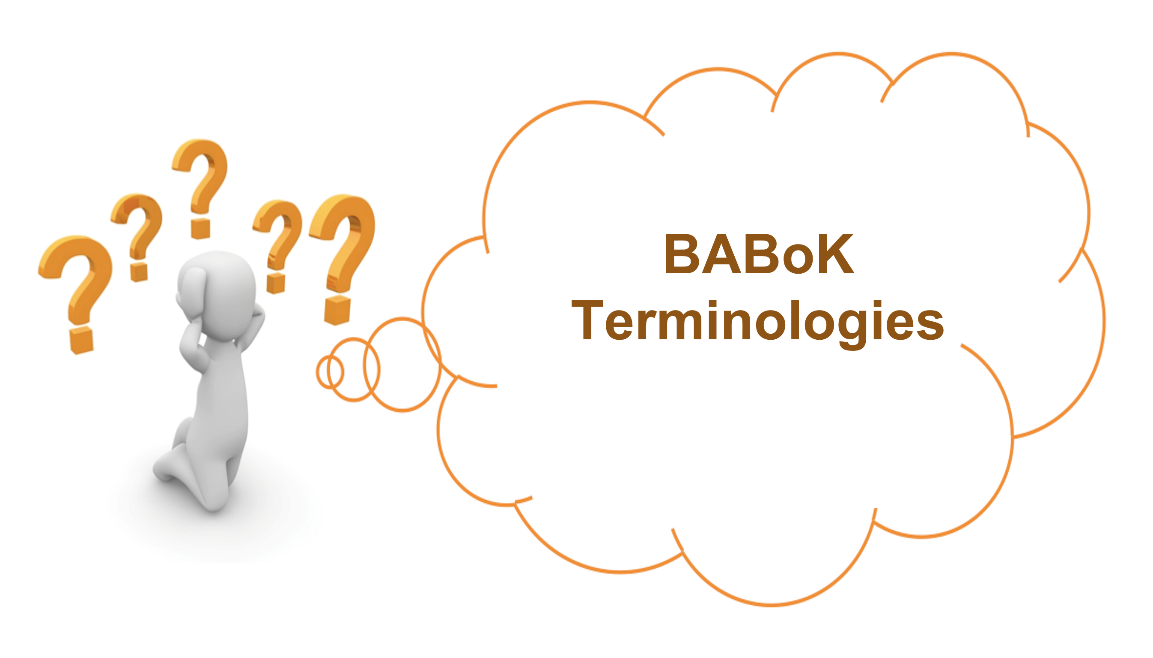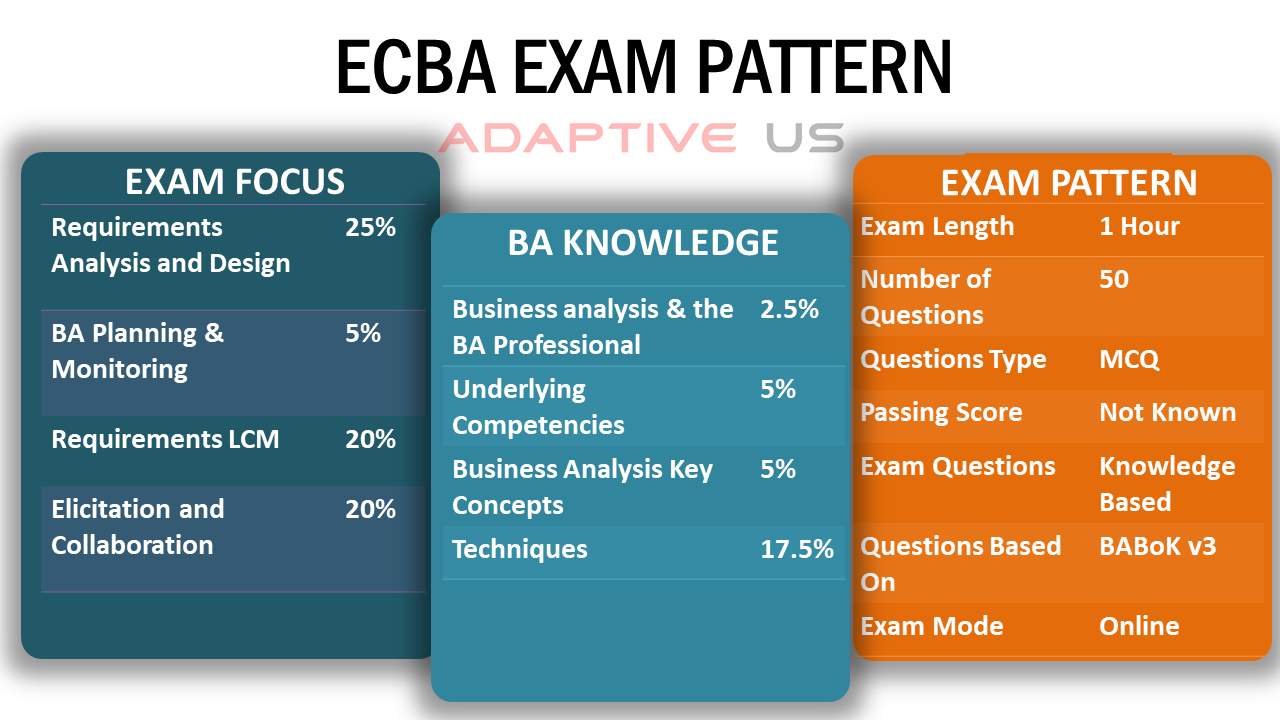
With the adoption of digital transformation projects being one of the top goals for the companies, the demand for the business analysis career is booming. As a result, the demand for this profession is growing at a double-digit rate year on year.
Business analysts play a crucial role in facilitating digital transformation projects by designing systems aligned with business goals. They are also pivotal in implementing new business processes, removing inefficiencies from the existing processes, and reducing operational costs.
Due to the strategic nature of this role and the earnings involved, more and more professionals are considering transitioning to this role as their next career move.
A quick way of learning the techniques and skills for becoming a business analyst is to get an internationally recognized certification like ECBA.
ECBA provides a firm understanding and a solid foundation for a business analysis career. It is the entry-level certification from IIBA aimed at professionals stepping into the BA domain.
This certification allows professionals many opportunities for career growth and skill development.
The ECBA course was designed keeping the needs of entry-level BAs in mind. The focus areas are- requirements analysis, modeling, and requirements life cycle management, with a lot of emphasis on modeling concepts tools and is well structured. The certification is based on BABoK version 3.0 of the IIBA.
While getting certified is a rewarding experience, there are many who do not succeed despite investing time, effort, and commitment to prepare.
This blog talks about the top reasons people fail in their ECBA exam and recommends strategies that can help avoid the failure traps.
1. Memorizing BABoK

Answering questions on the ECBA requires a proper understanding of the concepts in BABoK. In addition, the application of the tasks and techniques needs to be understood clearly. Though retaining concepts from BABoK is helpful, it is not advisable to memorize and write them during the exam.
2. Not understanding BABoK terminologies

ECBA exam is knowledge-based. For answering correctly, you'll need to be familiar with the terminologies. IIBA exams use terms from BABoK that your organization may not commonly use. Familiarize yourself with the terms and how they relate to the terms used by your organization. Your performance in the exam can be hampered if you cannot correlate the knowledge from BABoK. The exam is based on content from BABoK and not specific organizational practices.
A BABOK glossary can help explain the different terms.
3. Not understanding the purpose of each task and the roles of various stakeholders.
Not understanding the tasks' purpose and stakeholder roles could make it hard to clear the ECBA exam questions. Therefore, focus on understanding BABoK terminologies and concepts and understanding stakeholder roles and responsibilities rather than memorizing them.
4. Unsure of the strength, limitations, and application of techniques

Since ECBA is aimed at freshers and newbies, their knowledge of the BA terms and techniques is at times limited. Being unsure about the strengths and application of the techniques can be a limiting factor while writing the exam.
So, while preparing for the exam, it is imperative to understand the purpose and application of the techniques.
Also, remember advanced techniques like diagrams or those with extensive financial calculations are unlikely to come for the ECBA exam.
5. Giving equal priority to each Knowledge Area
To prepare effectively, one needs to be aware of the ECBA exam pattern and the weightage given to each knowledge area as per the exam blueprint.

Therefore, it is best to prepare by giving weightage to areas by looking at the exam blueprint.
Most questions are expected to be single-sentence questions. The best areas to focus on would be understanding the purpose of tasks and techniques, definitions of role and requirements characteristics, etc. Any other questions like diagrams and calculations, advanced modeling concepts, advanced techniques are unlikely to appear.
6. Not knowing clever ways of answering the questions

The ECBA exam has many questions that can confuse the exam taker due to the words used in the questions. Care should be taken while answering questions that typically include words like not, never, certainly, always, only, etc. There can also be trick questions asking for 'missing items' or 'the least likely option.'
There might be answers containing words that sound like BABoK terms but are not from BABoK.
Read the questions and options clearly. Then, choose the option that has BABOK terminology. These are made-up terms to confuse the exam taker; beware of those.
Deal with questions smartly and carefully. Don't rush through them distracted by time constraints.
7. Not having proper infrastructure for the exam

Just like any other exam, it can be stressful to write the ECBA certification exam, especially for those professionals who might not have appeared for an exam for years.
The easiest part is to have the infrastructure ready to avoid stress building up due to its lack.
It is important to go through the infrastructure checklist and ensure that the mandated documents and resources like ID card, camera, clean room and table, computer (having admin access), uninterrupted power supply, an empty room without unnecessary items like headphones, etc., to name a few, are all available at the time of the exam
In an already tense situation, unwanted stress due to infrastructural issues should be avoided. For example, last-minute delays in starting the exam can cause unnecessary stress and lead to the exam going beyond one's control.
Here is a must-follow e-book for tips on Dos and Don’ts of the IIBA online exam.
8. Poor time management

Another mistake first-timers make is spending too much time per question. Unfortunately, there are a lot of cases where people are unable to complete the exam due to a lack of time. The exam requires 50 multiple-choice questions need to be answered in one hour. So, one doesn't have the luxury of time in completing the exam.
Time management is an absolute key parameter in acing the ECBA exam. Avoid taking breaks during the 1-hour exam as the clock does not stop for you.
9. Spending more time on one question
Some questions are more time-consuming than others. Be conscious of the time spent on each question. Divide your allotted time in such a way that you have about 10 minutes towards the end to review the answers. If a question takes more time, it's wise to mark it for review, move on and get back to it later. Devise a time management strategy that best suits you and helps maximize your time during the exam.
10. Not having the right resources for preparation
ECBA exams, like other competitive exams, have a blueprint or pattern. Not doing enough actual exams like simulators and model questions will make it challenging to face the exam confidently. Proper preparation resources, practice tests, and ECBA exam simulators are needed to pass the exam.
The ECBA Certification Training Course will give you the resources necessary to prepare for certification. In addition, this will help you to determine the best study method for you. Grab a copy of our best-selling eBook- 200 IIBA Exam Mock Questions with IIBA Exam Info utilized by 1000s of BA professionals to ace their IIBA exam.
Author: Ananya (Ann) Pani, Co-Founder, Adaptive US
 Ananya's mission is to help business analysts to build successful professional careers. She has touched the lives of 5000+ Business Analysis professionals in their skill development journey and helped them unleash their true potential and leverage it to achieve their dream career.
Ananya's mission is to help business analysts to build successful professional careers. She has touched the lives of 5000+ Business Analysis professionals in their skill development journey and helped them unleash their true potential and leverage it to achieve their dream career.
She co-founded Adaptive US, a Business analysis skill development organization working with professionals from 80+ countries in skyrocketing their BA career and staying ahead of the game.
Grab a copy of our best-selling eBook- 200 IIBA Exam Mock Questions with IIBA Exam Info utilized by 1000s of BA professionals to ace thier IIBA exam.
She is a strong supporter of encouraging women workforce in technology and bringing women back to work after long career breaks. 70% of Adaptive's workforce is working moms who have been brought back to work after a career break due to family and other priorities.
She is enthusiastic about fitness, a regular runner, and takes keen interest in imparting value based education to children, building a greener and healthier world.
Please write to Ann if your thoughts are in sync with hers or if they spark a thought in you.